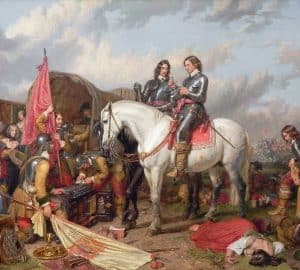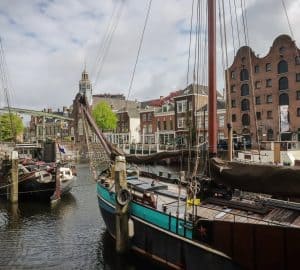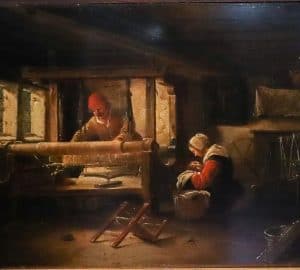
In Genesis 17:7, God Almighty promised the patriarch Abraham, “And I will establish my covenant between me and thee and thy seed after thee in their generations for an everlasting covenant, to be a God unto thee, and to thy seed after thee.” The God of Abraham, Isaac, and Jacob has been faithful to this promise throughout the ages of Christian history, for Galatians 3:9 says, “So then they which be of faith are blessed with faithful Abraham.” In these paragraphs, we will consider how a faithful Scottish patriarch in the early 1600s trusted in this everlasting promise that God had made to him and to his believing seed.
Pastor Andrew Duncan described himself this way in his last will and testament, “a sinful wight, Christ’s unworthy minister in His glorious gospel.” Andrew Duncan was a minister of the Kirk (Church) of Scotland in the little village of Crail, in the shire of Fife. Fife lies between the Firth of Tay and the Firth of Forth on the west coast of Scotland. Born during the days of John Knox, Andrew Duncan faithfully carried on in his own generation the work of the Reformation. He was an uncompromising and bold preacher of the Gospel. Throughout his long ministry, he and his family suffered much for the sake of the Gospel.
In 1606 Pastor Duncan was tried and found guilty of High Treason for participating in the famous Assembly of Aberdeen. At this assembly, a few bold Scottish ministers had assembled in defiance of the will of King James I. By resisting the royal prerogative of the king to rule on ecclesiastical matters, they had brought down the wrath of James. For participating in the protest at Aberdeen, Andrew Duncan was sentenced to be confined in Blackness Castle, a bleak fortress on the shore of the Firth of Forth. After an imprisonment of 14 months, Andrew Duncan was banished to France. After a brief sojourn there, he boldly returned to this native Scotland to carry on the work.
For many years Andrew Duncan traveled from place to place, preaching the gospel of Christ. He was united in marriage to a Godly young Scottish lassie, and together the Duncans raised six children. On several occasions during these hard years Pastor Duncan was arrested and often escaped very narrowly with his life.
In 1619 Duncan joined with other faithful Scottish ministers in opposing the Five Articles of Perth, in which the Scottish church was required to conform to the forms and ceremonies of the English episcopal system. For his opposition, Duncan was summoned to appear before the High Commission Court at St. Andrews. At his trial, he boldly likened the prelates who accepted the English ceremonies to Esau who sold his birthright for a mess of pottage, to Balaam, who loved the wages of unrighteousness, and to Judas, who betrayed the Lord for thirty pieces of silver. For this audacious speech, the Archbishop of St. Andrews deposed Duncan and commanded him on pain of death to leave Scotland forever.
Andrew Duncan dearly loved his wife and six children and could not bear the thought of separation. Boldly, he decided to take them with him across the river Tweed to Berwick, in the extreme northern tip of England. There, just across the river from his beloved Scotland, he was still under the rule of James, but outside the reach of the Archbishop of St. Andrews. Shortly after arriving in Berwick, Duncan’s wife was near the point of delivering another child. The labor was difficult, and the lonely father despaired for the life of his wife and her unborn child. The banished minister had no friends in Berwick, and to make himself known in a search for a midwife would be to fall under the eyes of those who sought his life.

Andrew Duncan had no other recourse than to call upon the Prince of Life to send deliverance in their hour of need. Slowly, reverently, the pastor knelt on the ground, took off his Scottish bonnet, and laid it on the bed. His wife, already in the pain of delivery, took hold of her husband’s hand as he bowed his head to pray. The older children stood in solemn order around the bed, joining in their father’s petition.
It was after midnight, and the streets of Berwick were silent. As the father finished his prayer, he encouraged his wife saying, “We serve a gracious Master.” His wife acknowledged God’s goodness, expressing the hope that the God who had never forsaken them before would stand by them now. Suddenly, the snort of a horse was heard in the yard. The family froze in momentary fear at the thought of discovery. But Andrew Duncan advanced to the door to find a woman, clad in the plain but neat garment of a country gentlewoman.
Not knowing what else to do, Duncan cautiously admitted the stranger to his wife’s chamber. The visitor sent the boys, John, William, and David, scurrying to stoke up the fire. The older daughters assisted as the visitor directed. Andrew Duncan sat by the side of his wife and prayed. After a few short minutes, the visiting lady delivered the baby with no complications. When the newborn infant was washed and nestled contentedly in the weary mother’s bosom, the lady produced a basket containing provisions and an abundance of fine linen. She then handed the grateful father five pieces of gold, telling him to be of good comfort, that he and his wife should not want for anything they needed.
The visiting lady then bade the Duncans farewell. The father and children accompanied her to the yard. At the door, Andrew Duncan took her hand and asked her what her name might be, that they might know how to thank their Heavenly Father for her kindness. The lady smiled, gently shook her head, and then turned and mounted her horse. Their eyes streaming with tears of gratitude for their heavenly deliverance, the Duncans watched her ride off into the night. They saw the visitor no more. Andrew Duncan assembled his family again, asking God’s blessings upon the new little life, and thanking Him for his manifold promise, “I will be a God unto thee, and to thy seed after thee.”
Amazingly, the man who was willing to be a martyr was not destined to die a martyr’s death. He had rebuked both king and archbishop, but had, like Elijah of old, always eluded their grasp. He died in his bed, surrounded by his wife and family.
He left a last will and testimony that is still treasured by the grateful descendants of this Scottish patriarch. In his testimony, he said:
I, Andrew Duncan, a sinful wight, Christ’s unworthy minister in His glorious Gospel . . . set down the declaration of my will: First, as touching myself, I leave my soul to Christ Jesus who gave it, and when it was lost, redeemed it, that He may send his holy angels to transport it to the bosom of Abraham. As for the children whom God hath given me, I leave them to His providence, beseeching Him to lead them by His gracious spirit through this evil world and make them profitable instruments, both in kirk and commonwealth, beseeching them on the other part to set God before their eyes, to walk in His ways, holding their course to that glorious and fair-to-look-on heritage, which Christ hath conquered for them, and all them that love him.
The children and grandchildren of Andrew Duncan did indeed “hold their course.” One of his sons, William Duncan, was privileged to shed his blood as a martyr as a Covenanter. Others of the Duncan children and grandchildren were banished to Virginia during the Covenanter era. From Virginia, the Duncans went over the mountains into Kentucky. To this day, Andrew Duncan has descendants who give thanks for the noble heritage of their patriarch.
There is a quiet graveyard in the hills of rural Kentucky where five generations of direct Duncan descendants lie together, awaiting the dawn of Resurrection Day, when they will rise to enjoy that “glorious and fair-to-look-on heritage” of which their noble patriarch, Andrew Duncan, spoke long ago. God does indeed stand by His ancient promise, “I will be a God to thee, and to thy seed after thee.”
Bibliography
The Scots Worthies by John Howie
The Story of the Scottish Church by Thomas McCrie
A Cloud of Witnesses by John Thomson
The accumulated family records of the Duncans




